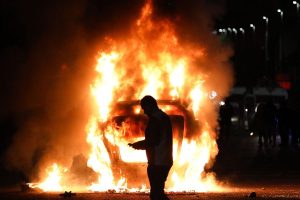There’s a sentimental old Irish song which begins:
“If you’re Irish, come into the parlour,
There’s a welcome there for you;
If your name is Timothy or Pat,
As long as you come from Ireland
There’s a welcome on the mat…”
Despite this toe-curling stuff, the Irish aren’t a particularly sentimental bunch. A lifetime of labour on a small tenant farm wasn’t likely to predispose them to emotional self-indulgence. Rather, they were put on earth for other people to feel sentimental about, and the Irish themselves have been adept at parlaying this affection. Years ago, if you successfully applied for Irish citizenship, you would receive a passport and a bottle of whiskey. As the song might suggest, however, the spirit of hospitality for which the nation is legendary was always in shorter supply than it might appear. If your name is Timothy or Pat you can expect a fond welcome; if it’s Abdul or Noor you can get back to where you came from or risk having your front door smashed in.
Today, anti-immigrant violence is breaking out in a country which for a long time had far more of its citizens living abroad than at home. About a million people emigrated during the Great Famine of the 1840s, and a few million more did the same in the decades that followed. Getting out of the place has been one of the nation’s most cherished customs. And since it’s usually the most enterprising, resourceful individuals who jump ship, the exodus creamed off a lot of talent — along with a series of largely untalented US presidents. It also helped to provide Britain with a splendid lineage of stage comedy from Richard Steele, Oliver Goldsmith and Richard Brinsley Sheridan to Oscar Wilde, George Bernard Shaw and Brendan Behan. A lot of comedy springs from the tension between seeing a situation from the inside and the outside simultaneously, and the Irish émigré in London was peculiarly well placed in this respect.
It’s not surprising that Northern Ireland has been among the hot spots of racist conflict. There’s a history of hatred in the place which sometimes seems to run deep. This weekend, more than ever, is representative of that as tens of thousands turn out for the Protestant Orange marches, a flashpoint for sectarian tensions and a reminder of that antagonistic history. But if religious warfare has been quelled for the moment, some of those pent-up antagonisms are now being turned against Afghans and Romanians.
Northern Ireland is a small, parochial place where people don’t travel much, or are often eager to return home were they to move abroad. When choosing a university, many will favour Queen’s Belfast or perhaps Glasgow over Kent or Sussex. There are also natives of the North for whom Dublin is almost as foreign as Baghdad. At the same time, the province has the benefits and drawbacks of a place in which everyone knows everyone else. On the one hand, nobody can get above themselves, since everyone knows their grandfather was a wife-beater. And the young hothead who shot your son dead during the Troubles is now a respectable middle-aged grocer living a few streets down. On the other hand, the parochialism makes for a disposition to help one’s neighbour. Northern Ireland is one of the best places in Britain to collapse in the street.
But Northern Ireland also has a history of supremacism — something which perhaps lies beneath the recent violence in Ballymena, and the racist effigy of migrants in a dinghy, recently burned in Moygashel. In the 19th century, it was the only extensively industrialised part of the country, an illustrious example of progress and modernity in contrast with what was deemed to be a priest-ridden, spud-chewing, benighted peasantry to the south. Some of the spud-chewers spoke a foreign language, a notorious badge of social inferiority. Ashamed of their Gaelic surnames, a number of small tenant farmers and labourers took the name of their English or Scottish landowners instead, including (one imagines) an obscure family from the borders of Galway and Mayo which decided to appropriate the ancient Scottish name of Eagleton. The Titanic, pride of the Belfast shipyards, may have sunk, thus joining certain other much-celebrated British catastrophes (the Charge of the Light Brigade, Dunkirk, Peter Kay), but as the Belfast ship worker insisted, “She was alright when she left here”.
Along with Unionist Protestant arrogance went a culture of grievance and insecurity, an explosive political compound. When the Union flags are out in force in Belfast or Larne, you know that there’s general apprehensiveness about some Westminster measure which might sell their citizens down the river. The more you need to assert your identity, the less well-founded it is. True selfhood is what you can take for granted.
There was more to the country as a whole, needless to say, than priests and potatoes. It was in 19th-century Ireland that one of the most vital forms of modern politics was created. This was the mass movement, pioneered by the nationalist lawyer Daniel O’Connell, sweeping up thousands or even millions of the rural poor and eventually imitated in various shapes and sizes throughout the world. By and large, the rulers of Britain could envisage no more diabolical figure than O’Connell, despite the fact that his project was entirely peaceful. Modern mass politics was born in Ireland, in the teeth of smears and insults from the country’s colonial proprietors. Meanwhile, in the supposedly modern northeast of the nation, politics continued to be shaped by sectarian issues which ran back to the 17th century. So much for modernity.
There’s a streak of Ulster Protestant supremacism in the current hounding of immigrants in the North, though it’s by no means a protest confined to the Prods. Some working-class Catholics in Dublin are just as outraged. During the Troubles, some of the cannier intellectual apologists for Unionism appealed to the value of multiculturalism as a reason for sticking with Britain rather than throwing in their lot with the Irish Republic. This was always a two-faced argument, since there were precious few non-white faces in the North at the time, whatever may have been the case in London or Birmingham. You could thus mouth multicultural pieties without actually welcoming refugees.
It’s now become an even more disingenuous case, as in the years since the Troubles, parts of the Republic turned into multi-ethnic communities. The Celtic Tiger was now the much-touted icon of Irish modernity, while some of the citizens of Belfast and Derry continued to wrangle about justification by faith alone. Ireland had become a cool place to be, stuffed with glamorous British writers and actors taking advantage of its tax breaks for artists, while Northern Ireland continues to be archaically religious and socially conservative, propped up by financial handouts from Westminster which many of its politicians despise. The place may have produced Van Morrison, but you still struggle to get an abortion. Unionist politicians in the North can no longer denounce the Republic as a theocracy, given that no institution was now more cordially detested there than the Catholic Church.
It’s easy to point to the irony of a nation traditionally dependent on the generosity of others now shutting its door to the stranger. Whole villages in the impoverished west of the country would have sunk without trace in the decades after the Great Famine had it not been for the remittances sent home by members of the New York Police Department. This, to be sure, was a matter of the Irish helping the Irish, but there are also plenty of examples of other nations coming to the aid of the Irish who washed up on their shores. Emily Bronte’s Heathcliff in Wuthering Heights, who speaks a kind of “gibberish” and is picked up in Liverpool, a city packed at the time with immigrants from across the water, is probably an Irish refugee. The gibberish in question would have been the Irish language.
Yet the irony of those who were welcomed now failing to do as they were done by needs qualifying. Like almost all immigrants, the Irish were met with hostility as well as hospitality. If Heathcliff is taken in, it’s only to be treated with brutality. If some of those whose names weren’t Timothy or Pat hung out signs on their lodging houses reading “No Dogs, No Blacks, No Irish”, their exclusion from that sentimental parlour becomes rather more explicable. Besides, once you’ve taken in a bunch of white people like the Irish, they are likely to be assimilated and thus acceptable, as has happened in the United States and Australia. You can learn to embrace those whose difference is invisible.
Even so, there’s something peculiarly depressing about households in Ballymena having to hang signs on their doors reading “Local” to prevent them from being broken down. It’s a reminder that few things are more likely to drive men and women to rage than injustice. It’s just that the perception of injustice is in this case grotesquely displaced. Immigrants are often just as poor and needy as the natives who resent their very existence. They certainly have a great deal more in common with them than they do with the guardians of a system which chronically lacks the resources to fund adequate housing, health, education and other social services. If those resources were redirected from the private to the public sector, a good deal of rioting on the streets would come to an end. But that kind of wild talk sounds more like Jeremy Corbyn than sensible, pragmatic stuff.
a.appcomments {
background: #FFF;
border: 1px solid #446c76 !important;
font-family: benton-sans,sans-serif;
font-weight: 600;
font-style: normal;
font-size: 12px;
color: #446c76 !important;
padding: 12px 50px;
text-transform: uppercase;
letter-spacing: 1.5px;
text-decoration: none;
width: 100%;
display: block;
text-align: center !important;
}















![Alex Acosta, right, who served as Secretary of Labor in President Donald Trump's administration, was quoted as saying he was "told to back off [Jeffrey] Epstein" when he was a Department of Justice prosecutor "because he belonged to intelligence."](https://www.constitutionpatriots.com/wp-content/uploads/2025/07/1752005416_I-Was-Told-to-Leave-Epstein-Alone-Because-He-Belonged-350x250.jpg)



